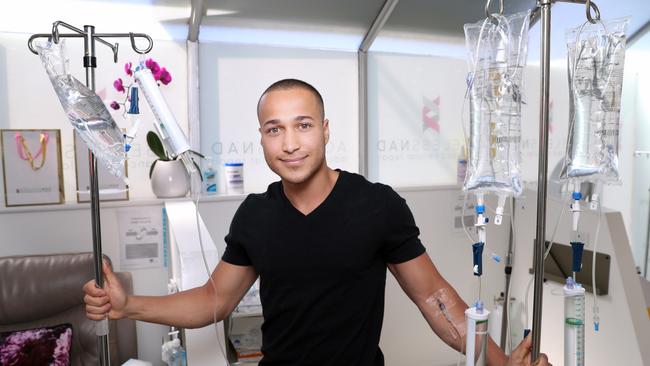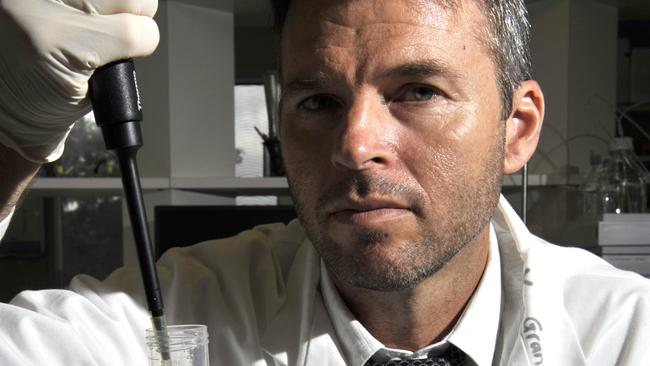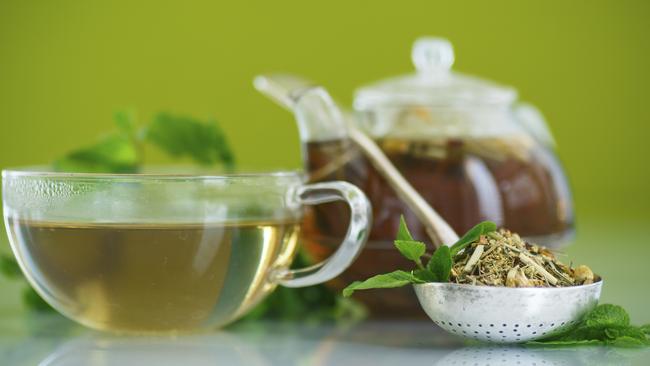The vitamin supplement that could help combat ageing
I’ve been using a vitamin supplement scientists hope can combat ageing for over a year and blood tests show it’s working. So why is my hair still grey and my face still wrinkled, asks health reporter Sue Dunlevy.

Health
Don't miss out on the headlines from Health. Followed categories will be added to My News.
Cheating death is becoming a boom industry and it’s attracting cranks as well as technology billionaires.
The menu options for fighting off death are bizarre. You can have the blood of a 19-year-old infused into your veins, starve yourself for years or expose yourself to extreme cold to reduce cell damage caused by inflammation.
These bio-hacking measures seemed worse than the problem they were trying to solve when I first began investigating anti-ageing medicine a year ago.
Then I stumbled across the simple solution everyone wants — an anti-ageing vitamin supplement.
As a health reporter who has public relations companies pitching miracle cures to me every day I was very sceptical but decided to put it to the test.
A year on I can report back that blood tests show it’s working.
I have more than doubled my levels of a coenzyme called NAD that scientists think may work to slow down the ageing process.
Australian researcher has reversed ageing
How to make the ‘Elixir of Life’ smoothie
‘Aussie’ vitamins that come from China

I’m in my fifties but my NAD levels are now higher than normal for people aged 20-40.
Sydney Adventist Hospital researcher Dr Ross Grant, who helped develop the blood test to check NAD levels, says a normal level in a young person is between 20 and 30 micromoles per litre in blood.
My levels were 36.6 micromoles per litre.
NAD levels begin to decline once a person hits their 40s and scientists believe it’s a key reason why we age because it is involved in how cells turn the sugars, fats and proteins that we eat into forms of chemical energy used to keep the body alive.
It could be the placebo effect but since I started taking the pills I do feel like I have more stamina, exercise is easier and I feel like I have more energy.
At the end of an extremely busy day I’m no longer deflated as I was in the past, I can exercise harder and longer and get more done in a day.
Sadly my hair is continuing to go grey and I still have wrinkles, I haven’t lost any weight, I’m still not a good sleeper but my blood sugar readings are much lower.
The supplement I’m taking is a form of vitamin B3 called nicotinamide riboside that is found in trace amounts in milk.
In October 2018 the Food and Drug Administration allocated the pill its “Generally Recognised As Safe” (GRAS) designation and this month the European Food Safety Authority issued a positive opinion on nicotinamide riboside for use in a food supplement.
It’s also been approved for sale in New Zealand but not yet Australia.

Many of the academic experts I interviewed for an article I wrote on anti-ageing medicine last year were taking this supplement, others warned me many cancers need NAD to grow.
Interestingly Dr Grant says his research has also found if you push NAD levels high enough you can get cancer cells to die at least in a laboratory.
Researchers have shown mice on high fat diets who were given nicotinamide riboside gained 60 per cent less weight and their energy levels improved, they avoided fatty liver disease and diabetic neuropathy, noise-induced hearing loss, heart failure, and central brain injury.
They also had better survival and stem cell regeneration after they were irradiated.
Female mice and rats who were given the molecule had increased milk production and their offspring were stronger, less anxious and had better memory.
Six clinical trials of the supplement in humans confirmed it was safe at multiple doses and that it did raise NAD levels by 60 per cent compared to a placebo.
But the amazing results in mice were not replicated in humans and there is still not enough evidence about the risks or benefits of taking the supplement long term let alone whether it extends life.
Humans taking the supplement did not see a decrease in their body mass index and their maximum exercise capacity measured on a treadmill didn’t change, there were no differences in measures of blood glucose.
However, compared with placebo it lowered blood pressure and stiffness in arteries.
High blood pressure is associated with diseases of ageing like heart disease, stroke, cognitive impairment/dementia and chronic kidney disease.

Dr Grant, a biochemical pharmacologist who studies how emotional stress, diet and exercise produces changes in the body’s biochemistry that lead to oxidative stress says continual supplementation with nicotinamide riboside may not work long term as the body may adapt to expect it.
He’s more interested in how diet and exercise and other lifestyle habits can reduce oxidative stress levels on the body but agrees NAD does have an important role in cell health.
“We are not into anti-ageing, we are into cell regeneration and health and modulating the cell regeneration process,” he said of his research.
Each generation of cells accumulates damage as they regenerate and you can accelerate that by the lifestyle choices you make and your body will function less efficiently and you will age faster, he said.
“If you could slow down that decline, instead of the body declining over 65 years you could probably lead a healthy life well into the one hundreds,” he said.
The anti diabetes drug Metformin is another pill showing anti-ageing promise.
A study in 41,000 users over a nine-year period found it reduced dementia by 4 per cent, depression by 16 per cent, cardiovascular disease by 19 per cent, frailty by 24 per cent, and cancer by 4 per cent.
This month a bizarre new anti-ageing treatment — tickling the vagus nerve through the ear with a small electrical current — was reported as slowing down chronic diseases associated with ageing.
Yes nicotinamide riboside has raised NAD levels but it turns out it’s not enough to combat ageing.
Another test undertaken by Dr Grant shows my stressful lifestyle, tea addiction and lack of sleep means my oxidative stress levels are still very high.
This oxidative stress level is high enough to be causing damage to my cells despite my higher NAD levels.

Dr Grant’s suggestions to keep your cells healthy and combat oxidative stress:
* Reducing calorie intake by 10 per cent might slow the ageing process.
*Switching from black to green tea and adding some citrus juice to it will increase my antioxidant levels in the body.
* Eating 30g of ground flaxseeds a day will reduce blood pressure.
*Sleeping more. Poor sleep reduces glucose tolerance, increases blood pressure and in the long term is associated with increased risk of cardiovascular disease. Those who sleep five or less hours a night have double risk of heart disease.
* Eating foods that are orange or yellow or red like watermelons, tomatoes, pumpkins, papaya, mangoes that are also good antioxidants.
Originally published as The vitamin supplement that could help combat ageing


